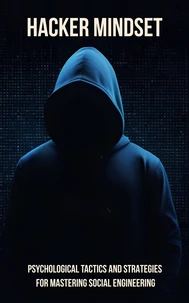The Art of Exploit Development: A Practical Guide to Writing Custom Exploits for Red Teamers
Par :Formats :
Disponible dans votre compte client Decitre ou Furet du Nord dès validation de votre commande. Le format ePub est :
- Compatible avec une lecture sur My Vivlio (smartphone, tablette, ordinateur)
- Compatible avec une lecture sur liseuses Vivlio
- Pour les liseuses autres que Vivlio, vous devez utiliser le logiciel Adobe Digital Edition. Non compatible avec la lecture sur les liseuses Kindle, Remarkable et Sony
 , qui est-ce ?
, qui est-ce ?Notre partenaire de plateforme de lecture numérique où vous retrouverez l'ensemble de vos ebooks gratuitement
Pour en savoir plus sur nos ebooks, consultez notre aide en ligne ici
- FormatePub
- ISBN8227817945
- EAN9798227817945
- Date de parution31/05/2023
- Protection num.pas de protection
- Infos supplémentairesepub
- ÉditeurBig Dog Books, LLC
Résumé
"The Art of Exploit Development: A Practical Guide to Writing Custom Exploits for Red Teamers" delivers an exhaustive, hands-on tour through the entire exploit development process. Crafted by an experienced cybersecurity professional, this resource is not just a theoretical exploration, but a practical guide rooted in real-world applications. It balances technical depth with accessible language, ensuring it's equally beneficial for newcomers and seasoned professionals.
The book begins with a comprehensive exploration of vulnerability discovery, guiding readers through the various types of vulnerabilities, the tools and techniques for discovering them, and the strategies for testing and validating potential vulnerabilities. From there, it dives deep into the core principles of exploit development, including an exploration of memory management, stack and heap overflows, format string vulnerabilities, and more.
But this guide doesn't stop at the fundamentals. It extends into more advanced areas, discussing how to write shellcode for different platforms and architectures, obfuscate and encode shellcode, bypass modern defensive measures, and exploit vulnerabilities on various platforms. It also provides a thorough look at the use of exploit development tools and frameworks, along with a structured approach to exploit development."The Art of Exploit Development" also recognizes the importance of responsible cybersecurity practices.
It delves into the ethical considerations of exploit development, outlines secure coding practices, runtime exploit prevention techniques, and discusses effective security testing and penetration testing. Complete with an extensive glossary and appendices that include reference material, case studies, and further learning resources, this book is a complete package, providing a comprehensive understanding of exploit development.
With "The Art of Exploit Development, " you're not just reading a book-you're enhancing your toolkit, advancing your skillset, and evolving your understanding of one of the most vital aspects of cybersecurity today.
The book begins with a comprehensive exploration of vulnerability discovery, guiding readers through the various types of vulnerabilities, the tools and techniques for discovering them, and the strategies for testing and validating potential vulnerabilities. From there, it dives deep into the core principles of exploit development, including an exploration of memory management, stack and heap overflows, format string vulnerabilities, and more.
But this guide doesn't stop at the fundamentals. It extends into more advanced areas, discussing how to write shellcode for different platforms and architectures, obfuscate and encode shellcode, bypass modern defensive measures, and exploit vulnerabilities on various platforms. It also provides a thorough look at the use of exploit development tools and frameworks, along with a structured approach to exploit development."The Art of Exploit Development" also recognizes the importance of responsible cybersecurity practices.
It delves into the ethical considerations of exploit development, outlines secure coding practices, runtime exploit prevention techniques, and discusses effective security testing and penetration testing. Complete with an extensive glossary and appendices that include reference material, case studies, and further learning resources, this book is a complete package, providing a comprehensive understanding of exploit development.
With "The Art of Exploit Development, " you're not just reading a book-you're enhancing your toolkit, advancing your skillset, and evolving your understanding of one of the most vital aspects of cybersecurity today.
"The Art of Exploit Development: A Practical Guide to Writing Custom Exploits for Red Teamers" delivers an exhaustive, hands-on tour through the entire exploit development process. Crafted by an experienced cybersecurity professional, this resource is not just a theoretical exploration, but a practical guide rooted in real-world applications. It balances technical depth with accessible language, ensuring it's equally beneficial for newcomers and seasoned professionals.
The book begins with a comprehensive exploration of vulnerability discovery, guiding readers through the various types of vulnerabilities, the tools and techniques for discovering them, and the strategies for testing and validating potential vulnerabilities. From there, it dives deep into the core principles of exploit development, including an exploration of memory management, stack and heap overflows, format string vulnerabilities, and more.
But this guide doesn't stop at the fundamentals. It extends into more advanced areas, discussing how to write shellcode for different platforms and architectures, obfuscate and encode shellcode, bypass modern defensive measures, and exploit vulnerabilities on various platforms. It also provides a thorough look at the use of exploit development tools and frameworks, along with a structured approach to exploit development."The Art of Exploit Development" also recognizes the importance of responsible cybersecurity practices.
It delves into the ethical considerations of exploit development, outlines secure coding practices, runtime exploit prevention techniques, and discusses effective security testing and penetration testing. Complete with an extensive glossary and appendices that include reference material, case studies, and further learning resources, this book is a complete package, providing a comprehensive understanding of exploit development.
With "The Art of Exploit Development, " you're not just reading a book-you're enhancing your toolkit, advancing your skillset, and evolving your understanding of one of the most vital aspects of cybersecurity today.
The book begins with a comprehensive exploration of vulnerability discovery, guiding readers through the various types of vulnerabilities, the tools and techniques for discovering them, and the strategies for testing and validating potential vulnerabilities. From there, it dives deep into the core principles of exploit development, including an exploration of memory management, stack and heap overflows, format string vulnerabilities, and more.
But this guide doesn't stop at the fundamentals. It extends into more advanced areas, discussing how to write shellcode for different platforms and architectures, obfuscate and encode shellcode, bypass modern defensive measures, and exploit vulnerabilities on various platforms. It also provides a thorough look at the use of exploit development tools and frameworks, along with a structured approach to exploit development."The Art of Exploit Development" also recognizes the importance of responsible cybersecurity practices.
It delves into the ethical considerations of exploit development, outlines secure coding practices, runtime exploit prevention techniques, and discusses effective security testing and penetration testing. Complete with an extensive glossary and appendices that include reference material, case studies, and further learning resources, this book is a complete package, providing a comprehensive understanding of exploit development.
With "The Art of Exploit Development, " you're not just reading a book-you're enhancing your toolkit, advancing your skillset, and evolving your understanding of one of the most vital aspects of cybersecurity today.























